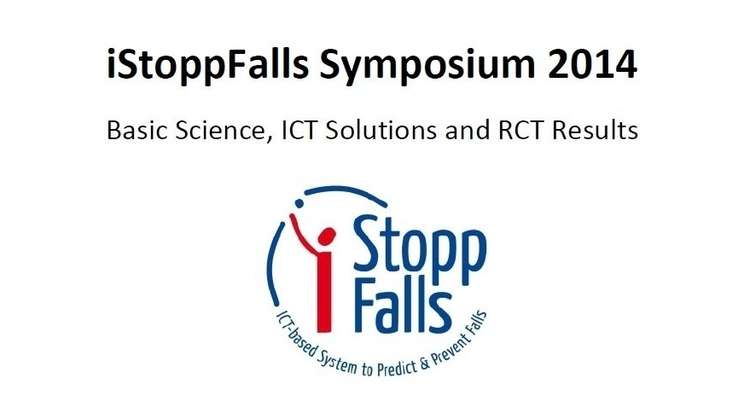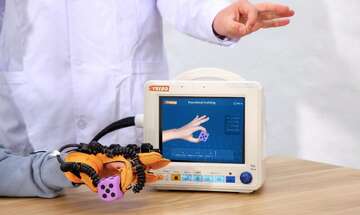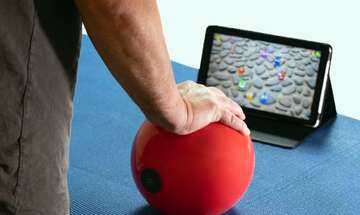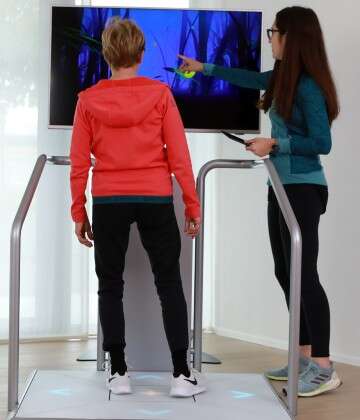iStoppFalls Symposium 2014 Announced
 images: ISTOPPFALLS.EU
images: ISTOPPFALLS.EU The iStoppFalls Symposium will be held at German Sports University Cologne on October 24 and 25, 2014. The event will cover a broad range of topics related to fall prevention.
The iStoppFalls Symposium 2014 will be held at the NetCologne Building of the German Sports University Cologne in Cologne, Germany, on Friday, October 24 and Saturday, October 25. The sessions at the event will cover a wide range of topics related to fall prevention, from various clinical trials and training programs to the use of advanced technologies and interactive games.
Topics covered at the symposium will include the role of technology in the current healthcare paradigm shift, daily life activity and fall risk, the link between physical activity and fall prevention, and evidence-based fall prevention methods. The speakers will explore the utilisation of sensor technologies, active games, and new methods for fall risk prediction. Research results of a study on fall preventive exergaming, conducted in Australia and Germany, will also be presented at the event.
The iStoppFalls project will be featured in several sessions at the symposium, with researchers from the University of Siegen presenting preliminary results of a randomised clinical trial with the system. The SureStep system, an interactive step training tool designed to improve balance and cognitive function in the elderly, will also be a featured topic. SilverFit will be a featured brand, with a presentation on the company's use of computer games to make rehabilitation programs more fun for seniors.
Other topics at the event will include the use of Kinect technology to measure functional movement in people suffering from Parkinson's disease, fall detection and tele-assistance with a service robot, and the effects of exergames on cognitive performance.
The iStoppFalls consortium, the group of institutions behind the iStoppFalls project, consists of a multidisciplinary team conducting research and developing solutions to prevent and predict falls. The project involves leading research experts and technology professionals both from industry and academic branches, and aims to strengthen the collaboration between them. The team members come from a variety of backgrounds, including active gaming technologies, exercise programs, fall prevention, unobtrusive sensing, end-user accessibility, and controlled clinical trials.
The consortium aims to develop an Ambient Assisted Living (AAL) system that will be able to predict and prevent falls. The system will perform continuous fall risk monitoring by keeping track of all the relevant risk factors and all activities related to mobility. Apart from doing risk assessment, the system will make it possible to create tailor-made exercise programs, coached by iStoppFalls, to address the risk factors.

iStoppFalls will use the Senior Mobility Sensor to unobtrusively monitor seniors' activity in daily life and evaluate data on the duration, frequency, and type of mobility activities, as well as information related to muscle power and balance function. The sensor is designed to be worn as a necklace and to not interfere with the wearer's daily life. The device will also deliver information on the effectiveness of fall prevention training and send feedback to the training system to create personalised exercise programs.
As part of the project, the team's Kinect-based fall prevention game will make it easier to track the training programs and collect data, while the eHealth platform will deliver a Knowledge Based System for Fall Prediction & Prevention, linking the data acquired from both the game and the Senior Mobility Sensor.
The iStoppFalls project is funded by the European Union's Seventh Framework Programme for research, technological development, and demonstration. The Australian arm has received funding through an Australian National Health and Medical Research Council (NHMRC) EU collaboration grant.
The partners in the iStoppFalls consortium are the German Sports University Cologne, Kaasa Solution GmbH, University Siegen (Germany), Austrian Institute of Technology (Austria), Instituto de Biomecanica de Valencia (Spain), Philips Research Europe (the Netherlands), and Neuroscience Research Australia (Australia).
Each of the partners brings something unique to the table. The technology power is provided by Philips Research Europe, Instituto Biomecanica Valencia, Kaasa Solution, and the Austrian Institute of Technology. University Siegen provides expertise in end-user accessibility and HCI concepts, while Neuroscience Research Australia and the German Sports University Cologne provide experience and knowledge of fall prevention.

 SEND INQUIRY
SEND INQUIRY









